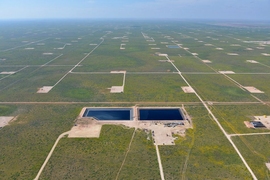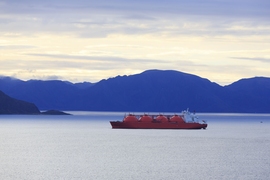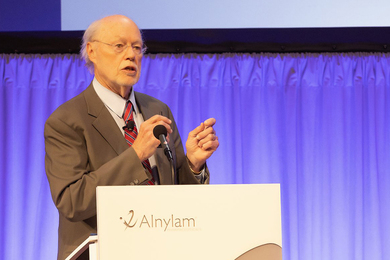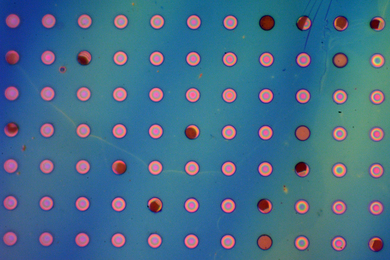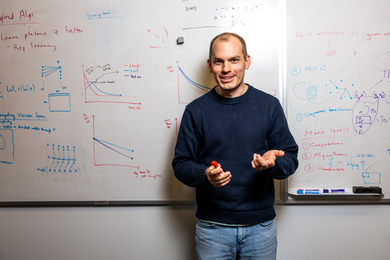Studying energy ventures as a Sloan Fellow in 2012, Josh Adler was struck by the enormous expansion of unconventional oil and gas production in recent years. “Anything that’s become that big that fast has to have all kinds of chaos in its supply chains and operations, and all kinds of problems to solve,” he points out.
One big problem quickly became apparent: challenges in acquiring water to complete the wells. Each well requires millions of gallons of water to complete. Most hydraulic fracturing takes place in water-stressed areas. And water supplies can be less than fluid, Adler notes.
“Imagine you’re a manager for oil and gas production in Midland, Texas, and you’re ready to complete one of your wells,” he says. “You start to send a fleet of hundreds of trucks to pick up the ground water supply you reserved months ago, but now you find out that there’s a drought and the well’s dry or the water authorities want to conserve its water. You’ve got a delay cost of $400,000 a day, and you don’t have the water to start the well completion. What do you do?”
Such difficult but far-from-uncommon scenarios were the genesis of Sourcewater, an online exchange founded by Adler, a serial entrepreneur in Internet matchmaking, medical devices, and real estate startups. Sourcewater will provide petroleum producers and other industrial users a marketplace to source, recycle, and manage the water they need — “something that’s completely new to the water industry,” he says.
With Sourcewater, Adler says, a petroleum production manager or water engineer “can go online and locate all the sources of water near them, see the qualities of those sources, see their prices, and book these different sources in whatever volume they need — basically completing that water planning and booking process that used to take days or weeks in 10 minutes.”
A second major Sourcewater strength is the ability to avoid the use of freshwater and instead use recycled water, often produced from a nearby oil or gas well.
“Oil and gas wells produce way more water than they produce oil or gas, and there’s really not a whole lot you can do with that water unless you heavily treat it,” Adler points out. “But it turns out that there’s very little treatment needed in order to reuse that water in place of freshwater in a new oil or gas well.”
The potential cost benefits could be significant. As one example, Adler notes that it can cost more than $20 per barrel to dispose of wastewater from oil and gas production in Pennsylvania’s Marcellus Shale area, with the wastewater often trucked to disposal wells hundreds of miles away. But if Sourcewater shows that another energy firm nearby is ready to complete wells, the wastewater could travel just a few miles down the road.
In this scenario, one company might end up spending $5 or $10 a barrel for wastewater disposal where they would have spent $20 a barrel, and the other company might get paid $5 or $10 a barrel rather than paying $3 a barrel, Adler says. “Everybody comes out ahead, mainly because of that reduction in trucking cost.”
The primary expense for incoming and outgoing water supplies is transportation, he emphasizes. “Overall, we’re creating greater efficiency by reducing the average distance of truck travel between the source point and the use point for water, because we’re creating so many more locations from which you can obtain or send water.”
Reducing the amount of truck travel via the new online marketplace also brings environmental benefits. So does maximizing the recycling of wastewater from oil and gas production, which currently has two disposal options, neither of them great, Adler says. Water that is injected into disposal wells is removed from the hydrological cycle forever, and there is some evidence linking it to seismic events in certain geographic areas. The other option is wastewater treatment, but treatment plants generally were not built to handle oil and gas wastewater, so the discharged water may meet regulatory standards without matching the existing water quality in surrounding rivers and streams.
Sourcewater is now in beta testing, getting usability feedback from several energy companies (some contacted through the MIT Energy Initiative). The company is looking for more participants as it rolls out a pilot trial this spring that will generate real-world transactions, and Adler expects that the marketplace will be fully live shortly thereafter.
He also plans to move briskly ahead to broaden Sourcewater’s infrastructure to cover the entire water management cycle. “It will be about finding the water, but also about finding the transport, the storage, the treatment, and ultimately either the recycling or disposal for the water,” he says.
While the market is initially concentrating on oil and gas production, Sourcewater will help to create new sources of supply in the water market “that just weren’t findable before, and weren’t even considered assets,” Adler says. Those could include wastewater from mining operations, treated effluent from municipal and private water treatment facilities, and agricultural runoff.
Over the long run, bringing all of those non-freshwater sources into a market will help to create discount water supplies, he suggests. “We’re creating a greater supply of water by making wastewater liabilities into industrial assets, and we’re making freshwater into the premium product.”
To learn more about Sourcewater and other MIT-connected startups, register on the MIT Startup Exchange and log in.

